
What makes an outstanding coffee?
The basis for exceptional coffee is the bean. Coffee trees fall into two categories, Robusta and Arabica.
Robustas produce high yields and grow well at low altitudes making them more common and less expensive.
Arabicas thrive at higher altitudes and produce much lower yields, making the beans scarce but of higher quality. The Arabica bean is the basis for outstanding coffee.
The Roasting Process

There are various processes used in roasting coffee beans. The French roast process uses a blend of different beans, which are roasted until they become dark and shiny, due to the caffeine oils emerging from the bean. For the Italian or espresso roast, a blend of different beans are roasted slightly lighter than the French roast, and used mainly for making Espresso and Espresso drinks. The Espresso roast can also be enjoyed as a bold, full-bodied coffee brewed any number of ways. The full city is the lightest of the roasts we offer. It brings out the true flavor of the origin of the bean – with consideration to the growing conditions, altitude, sun, soil, and rain making each country’s coffee unique to them.
Our Roasts
With the exception of those coffees in the “Dark Roast and Blends” category, all of our roasts are Full City (otherwise known as “medium”) roast.
Grind and Brew

You can use any roast in any brewer however grinding is specific for each method of brewing. Grinding coffee finer than recommended makes it more difficult for the water to seep through the grounds, resulting in bitter coffee. Grinding the beans too coarse allows the water to flow thru the grounds too quickly creating a weaker, less flavorful taste.
- Auto-drip coffee machines are the most common method of brewing. A medium grind is recommended for paper filter brewers, and a slightly coarser grind is recommended for metal or permanent filtered systems to prevent grounds from seeping through the mesh in the filter.
- For French press machines, where water and ground coffee are mixed together and pressed down after steeping, a coarse grind is needed to contain grounds in the bottom of the press.
- With the Melitta (or “pour-over”) method — boiling water is poured over the grounds and allowed to drip into a thermal carafe, a finer grind is used.